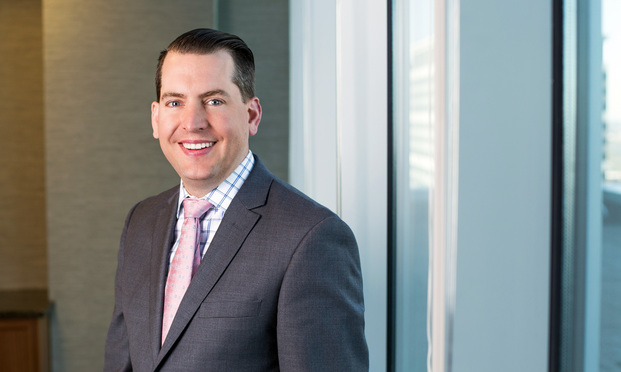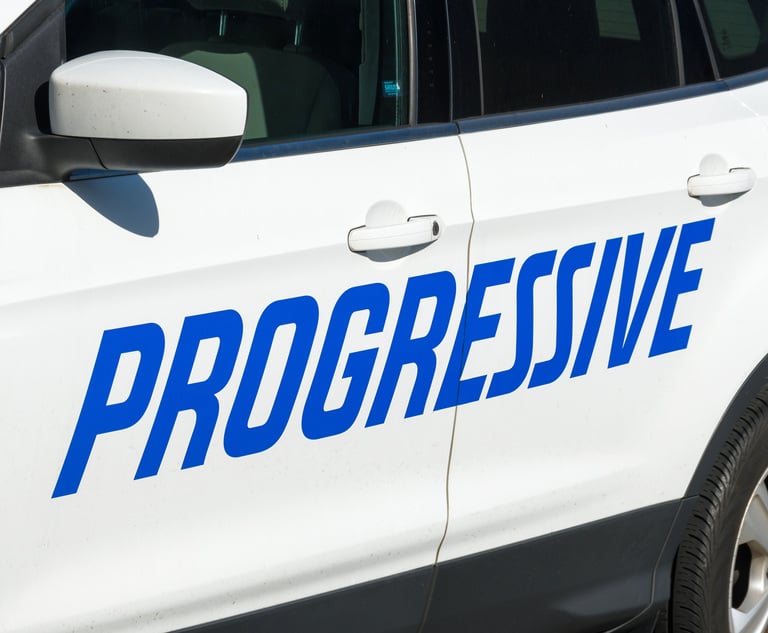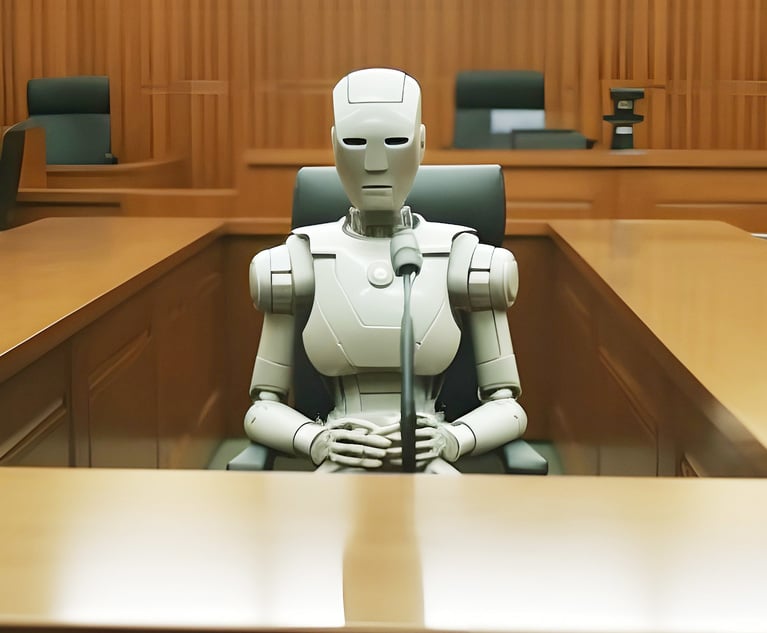Skilled in the Art: How PTAB is Boosting the Next Generation of IP Lawyers + Should the Law Discriminate Between AI and Human Inventors?
The U.S. Patent and Trademark Office is incentivizing applicants and litigants to provide stand-up opportunities to young lawyers.
May 01, 2020 at 07:47 PM
9 minute read
Welcome to Skilled in the Art. I'm Law.com IP reporter Scott Graham. Here's what's cracking this week:
• The PTO is incentivizing applicants and litigants to provide stand-up opportunities to young lawyers.
• Google and the Federal Circuit are doing likewise.
• The foundation is being laid for Congress to rethink how patent law should treat AI inventions.
As always, you can email me your feedback and follow me on Twitter.
 Rick Bisenius, Fish & Richardson P.C.
Rick Bisenius, Fish & Richardson P.C.
Young Lawyers Get Their 15 Minutes at the PTAB
I've been away for 10 days—or about five months in shelter-in-place time. So let's start today's briefing with a piece of unalloyed good news: The USPTO launched a program Tuesday that will give younger attorneys more stand-up roles before the PTAB.
The Legal Experience and Advancement Program (LEAP) will offer up to 15 additional minutes of argument time for teams that include a patent agent or attorney with less than seven years' experience, and three or fewer substantive oral arguments before a federal tribunal. "This plays a key role in helping the USPTO achieve its goal of offering legal experience and advancement to a diverse group of practitioners." U.S. Patent and Trademark Office Director Andrei Iancu said on his director's blog.
I spoke with Fish & Richardson principal Rick Bisenius, whose practice focuses on post-grant proceedings, about why this is a good deal not only for young attorneys, but for their clients too.
SITA: Even before this program, your firm has been trying to get younger attorneys speaking roles before the PTAB?
Bisenius: We're generally always trying to convince our clients that it's going to be within their best interest to let younger attorneys on a case argue at least a portion of it.
Q. And that's because the young attorneys are often deep into the details?
A. It's sort of a short-term and a long-term benefit. It can be a short-term benefit for that particular case, because yeah, a lot of times the younger attorney is the person that drafted a first draft of the petition and the first draft of the other briefs. And a lot of times their technical backgrounds are aligned with the technology that's at issue.
It really depends on the case, but a lot of times you can identify a discrete issue—it might be a dependent claim, or maybe one particular element in the independent claims that can be cleaved off from everything. The more junior person can really focus on that one issue.
Q. And the long-term benefit to the client?
A. For most of our clients, we're not just representing them at the PTAB once. From both the patent owner and the petitioner side, we're generally representing the same clients year after year. And so building these younger people to have that experience is going to benefit those clients in the future.
Q. So how does LEAP change the game?
A. There are two things I really like about it. The first is that it gives that carrot of the extra 15 minutes you can get for your arguments. Having that incentive is a good way to convince our clients that this really is a good opportunity.
The other thing I like about it—this is not necessarily a benefit for a firm like ours that does so much PTAB practice—is the training sessions. Sort of walk through how the oral hearing works, how demonstratives work, and things like that ahead of time.
Q. This program applies to attorneys or agents who have three or fewer arguments before any federal tribunal. So, these really are gonna be newbies, right?
A. Yeah.
Q. And the PTAB is generally a pretty hot bench, right? So, it's not like they should expect to give a statement and sit down.
A. I think I've been to maybe one oral hearing ever where somebody was able to talk for longer than five minutes without getting hammered with questions. I compare it to appellate practice. You're sort of done presenting your evidence. You're not cross-examining witnesses. It's really just you're having a conversation with the three judges, and they're trying to clarify whatever's puzzling them. So yeah, you have to be on your toes, and you have to ready to answer questions.
Q. Besides doing moot courts, what else can young attorneys do to prepare for this experience?
A. I'd say go and watch them. It's the same thing with appellate arguments or district court. Just being on the teams that help prepare these, and just going and watching the people that have done it before, that's how I learned. I sat in on dozens of these before I started arguing them.
SPONSORED BY ALM
Coronavirus (COVID-19) – Quick Reference Guide
This Coronavirus (COVID-19) reference provides info, tips, and tricks for this global pandemic. Use this quick reference to learn the basics and to understand how to identify the symptoms of the Coronavirus. This printable quick reference is yours to use, distribute, and share at your organization! Along with this free reference card, you will also receive more information from CustomGuide regarding their innovative interactive training and learning solutions to help improve the software skills of you and your staff for success in today's workplace. READ MORE
 Photo: Willy Barton/Shutterstock.com
Photo: Willy Barton/Shutterstock.com
CAFC and Google Support Young Attorneys Too
It may be that the U.S. Court of Appeals for the Federal Circuit has always had a LEAP program, and we never knew it because all of the cases where clients have counsel get arguments.
That tradition has been curtailed due to shelter-in-place orders. CAFC has been scheduling about half of its cases for telephonic arguments and submitting the rest on the briefs. But in the last week we learned that the court is willing to make exceptions for young attorneys.
Google recently asked the court to reconsider the cancellation of an argument in one case and to stay an appeal in another. In In re Publicover, Perkins Coie associate Theresa Nguyen had been scheduled to present her first Federal Circuit argument, and in In re Google Technology Holdings, the company is expecting Williams & Connolly associate Kathryn Kayali to present her first argument in any appellate court.
The court agreed last week to hold telephonic arguments after all in Publicover on May 11, and to stay Google Technology Holdings for 90 days when, with any luck, we'll be back to live arguments.
"Google appreciates the court's reconsideration," company spokesperson Jose Castaneda said. "We are committed to supporting diversity, inclusion, and providing opportunities for junior attorneys to gain valuable experience."

That's One Small Setback for a Machine …
The USPTO has issued its final decision: Machines, no matter how intelligent, cannot be named inventors on patents.
But the PTO's rejection of an application spearheaded by The Artificial Inventor Project will surely not be the last word on the subject. University of Surrey law professor Ryan Abbott, one of the driving forces behind the project, says an appeal to the Federal Circuit is already in the works. And the PTO has been soliciting public comment on the subject ahead of a report anticipated later this year.
This all seems to be laying the groundwork for future legislation, as Hogan Lovells partner Celine Crowson observed in a breakdown of the PTO decision you can read here.
Abbott says the applications the project has filed in the U.S., U.K. and European patent offices have raised important issues about IP and technological advances. "Still, we are hopeful that some courts and patent offices will be inclined to adopt forward-thinking positions, even in the absence of legislative activity," he says. "Ultimately, though, we do agree that appropriate policies for AI-generated works are an important matter of public policy, so there is a critical role for legislators."
If that's not enough food for thought, Abbott has a book forthcoming in June called The Reasonable Robot. It will argue that the law should not discriminate between AI and human behavior, and that "AI legal neutrality" could improve the tax, tort, IP and criminal law systems.

Quick Hits
➤ California's Sixth District Court of Appeal concluded a trade secret dispute that's been the subject of multiple appeals dating back to a 2003 jury verdict. The court affirmed Santa Clara County Superior Court Judge Joseph Huber's decision to apply the Georgia-Pacific factors from patent law in denying Ajaxo Inc. a royalty for E*Trade Financial Corp.'s use of Ajaxo trade secrets. A Morgan, Lewis & Bockius team featuring partners Joseph Floren, Thomas Peterson, Christopher Banks, Benjamin Smith and Sharon Smith; of counsel Debbie Quick; and associate Rachael Chan scored the win, which included an award of $213,000 in costs to E*Trade.
➤ In another long-running case, Illumina made its $27 million jury verdict against Ariosa Diagnostics and Roche Molecular Systems stick at the Federal Circuit, though it was unable to persuade the appellate court to enjoin Ariosa from marketing its Harmony fetal diagnostics test. Weil, Gotshal & Manges partners Ed Reines and Derek Walter and associate Christopher Lavin represented Illumina. Mark Fleming led a team of Wilmer Cutler Pickering Hale and Dorr and Irell & Manella attorneys for Ariosa and Roche.
➤ Emerson Electric has won the latest round in a long-running battle with NPE SIPCO LLC over wireless mesh network patents. SIPCO's litigation campaign against a wide range of smart device makers dates to 2005, and ownership stakes have passed over the years from General Electric and MPEG LA to Korean patent monetization firm Ideahub Inc., according to research by RPX Corp. Last week the ITC terminated a 337 investigation based on two SIPCO patents. The commission left in place determinations of invalidity on one patent and non-infringement on the other. Ropes & Gray partners James Batchelder, James Davis and Matt Rizzolo represented Emerson in In re the Matter of Certain Wireless Mesh Networking Products and Related Components Thereof.
That's all from Skilled in the Art this week. I'll see you all again next Friday.
This content has been archived. It is available through our partners, LexisNexis® and Bloomberg Law.
To view this content, please continue to their sites.
Not a Lexis Subscriber?
Subscribe Now
Not a Bloomberg Law Subscriber?
Subscribe Now
NOT FOR REPRINT
© 2025 ALM Global, LLC, All Rights Reserved. Request academic re-use from www.copyright.com. All other uses, submit a request to [email protected]. For more information visit Asset & Logo Licensing.
You Might Like
View All


AG in Texas Is Nation's First to Bring Gen AI Enforcement Action in Health Care
5 minute read
In-House Lawyers Weigh In on How AI Will Revolutionize Dispute Resolution
Law Firms Mentioned
Trending Stories
- 1Black Judges Discuss Growing Up During Segregation, Efforts to Diversify the Profession
- 2As They Dissolve the Firm, Equity Partners in Houston Trial Firm Hodges & Foty Dispute Over Access to Bank Accounts
- 3How I Made Office Managing Partner: 'Always Be Willing to Work Harder Than the Person Next to You,' Says Esther Cho of Stradley Ronon
- 4People in the News—Feb. 10, 2025—Flaster Greenberg, Tucker Arensberg
- 5The Support Center for Child Advocates Welcomes New Executive Director
Who Got The Work
J. Brugh Lower of Gibbons has entered an appearance for industrial equipment supplier Devco Corporation in a pending trademark infringement lawsuit. The suit, accusing the defendant of selling knock-off Graco products, was filed Dec. 18 in New Jersey District Court by Rivkin Radler on behalf of Graco Inc. and Graco Minnesota. The case, assigned to U.S. District Judge Zahid N. Quraishi, is 3:24-cv-11294, Graco Inc. et al v. Devco Corporation.
Who Got The Work
Rebecca Maller-Stein and Kent A. Yalowitz of Arnold & Porter Kaye Scholer have entered their appearances for Hanaco Venture Capital and its executives, Lior Prosor and David Frankel, in a pending securities lawsuit. The action, filed on Dec. 24 in New York Southern District Court by Zell, Aron & Co. on behalf of Goldeneye Advisors, accuses the defendants of negligently and fraudulently managing the plaintiff's $1 million investment. The case, assigned to U.S. District Judge Vernon S. Broderick, is 1:24-cv-09918, Goldeneye Advisors, LLC v. Hanaco Venture Capital, Ltd. et al.
Who Got The Work
Attorneys from A&O Shearman has stepped in as defense counsel for Toronto-Dominion Bank and other defendants in a pending securities class action. The suit, filed Dec. 11 in New York Southern District Court by Bleichmar Fonti & Auld, accuses the defendants of concealing the bank's 'pervasive' deficiencies in regards to its compliance with the Bank Secrecy Act and the quality of its anti-money laundering controls. The case, assigned to U.S. District Judge Arun Subramanian, is 1:24-cv-09445, Gonzalez v. The Toronto-Dominion Bank et al.
Who Got The Work
Crown Castle International, a Pennsylvania company providing shared communications infrastructure, has turned to Luke D. Wolf of Gordon Rees Scully Mansukhani to fend off a pending breach-of-contract lawsuit. The court action, filed Nov. 25 in Michigan Eastern District Court by Hooper Hathaway PC on behalf of The Town Residences LLC, accuses Crown Castle of failing to transfer approximately $30,000 in utility payments from T-Mobile in breach of a roof-top lease and assignment agreement. The case, assigned to U.S. District Judge Susan K. Declercq, is 2:24-cv-13131, The Town Residences LLC v. T-Mobile US, Inc. et al.
Who Got The Work
Wilfred P. Coronato and Daniel M. Schwartz of McCarter & English have stepped in as defense counsel to Electrolux Home Products Inc. in a pending product liability lawsuit. The court action, filed Nov. 26 in New York Eastern District Court by Poulos Lopiccolo PC and Nagel Rice LLP on behalf of David Stern, alleges that the defendant's refrigerators’ drawers and shelving repeatedly break and fall apart within months after purchase. The case, assigned to U.S. District Judge Joan M. Azrack, is 2:24-cv-08204, Stern v. Electrolux Home Products, Inc.
Featured Firms
Law Offices of Gary Martin Hays & Associates, P.C.
(470) 294-1674
Law Offices of Mark E. Salomone
(857) 444-6468
Smith & Hassler
(713) 739-1250








